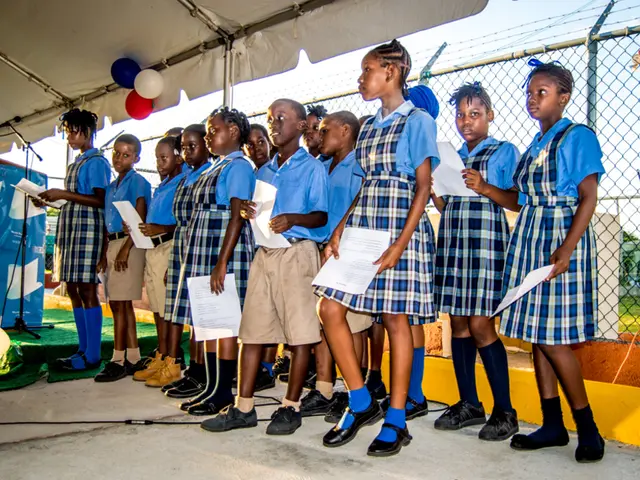Dialogue Highlights: Venezuela as a Bulwark Against Fascism: Discussion with Javier Couso
A Conversation on Fascism, Europe, and Venezuela
In the current political climate, it's vital to explore the problem of fascism, especially considering the circumstances in Venezuela. Javier Couso, a Spanish politician and writer, discusses his thoughts on this topic.
Fascism: A Global Concern
Venezuela serves as a beacon in the world's battle for sovereignty, independence, and democracy. At the same time, it stands against the seemingly liberal democracies that display fascist tendencies, primarily the United States and other Western powers. These nations have repeatedly attempted to overthrow Venezuela's democratically elected governments over the past quarter-century.
Recently, hundreds of intellectuals, politicians, and grassroots leaders from all continents gathered in Caracas for the World Congress Against Fascism. The event was significant, not just because of Venezuela's situation, but also because it paved the way for a genuine Anti-fascist International.
When discussing fascism, it's crucial to avoid using the term too loosely but actively recognize that self-proclaimed liberal democracies may employ fascist methods to defend their interests. Couso, who was born during the Franco dictatorship in Spain, draws attention to the atrocities committed by these liberal democracies, such as millions of deaths in Korea, Vietnam, and Africa during decolonization struggles, the Pan-Arab and Arab sovereignty wars, and the neocolonial Zionist project in Israel.
Although not identical to historical fascism, today's version retains elements of repression and social control while simultaneously supporting the Anglo-American empire, embracing Zionism, and remaining fiercely Russophobic and anticommunist.
In Europe, old-style fascism can still be found in Ukraine to some extent. The country, having undergone a US-backed coup in 2014, has allowed Nazi-inspired Ukrainian nationalism to take control in its proxy war against Russia. This nationalism originates from World War II-era fascism and continues to foster violent anti-Slavic and Russophobic sentiments.
The European Parliament and Venezuela
When it comes to criminalizing Venezuela in public opinion, the European Parliament plays an influential role. While lacking legislative power, it exerts strong symbolic power, shaping public opinion and influencing hidden power structures. The Parliament's actions contribute to manipulating the perception of Venezuela, presenting it as a state plagued with chaos, long lines, and unrest.
In reality, Couso highlights that during his visit to Caracas after serving as an electoral observer in the July 28 elections, he saw stability and gradual economic recovery despite the challenges faced by the country. He emphasized that the media portrayal of Venezuela in Spanish state media is a severe distortion of reality, amounting to a psychological operation or propaganda war.
The Influence of Maria Corina Machado and Venezuela's Ultra-Right in Europe
María Corina Machado, known for her ties with US soft power factories, advocates for policies that exacerbate suffering through illegal unilateral sanctions while promoting foreign invasions of Venezuela. In Europe, her influence plays a significant role in domestic politics, especially in Spain, where Venezuela has become a tool for scoring political points. Both far-right factions in Spain and Venezuela closely align with each other, and social democrats have also tacitly supported Venezuela's far-right, despite their purported progressive leanings.
Venezuela's Struggle Against Fascism
As a political analyst, Couso notes that Venezuela's government and people have successfully avoided civil conflict despite the coordinated spread of hatred through social media. An anti-fascist law currently under discussion in Venezuela's National Assembly is a critical step to equip citizens with the knowledge and tools necessary to defend themselves against psychological operations and cognitive warfare.
The Venezuelan government has shown remarkable restraint in dealing with the ultra-right, specifically during the July 28 elections when violent factions attempted to seize control. The Bolivarian National Armed Forces quickly extinguished the planned terrorist insurrection, preventing further conflict and demonstrating the country's resilience.
In conclusion, those committed to the Bolivarian Revolution must remain vigilant, firm in their opposition to the ultra-right's plot to overthrow a democratically elected government and advocate for democratic, anti-fascist values worldwide.
Enrichment Data:- The Anti-fascist International is represented through recent coordinated events and transnational left-wing movements.- Recent events include the Second International Anti-Fascist Forum, the III International Anti-Fascist Congress, and the Fourth International's call for a global anti-fascist and anti-imperialist resistance on May Day 2025.- Focus areas include opposition to neo-fascist ideologies, like white supremacy and neo-Nazism, and legal and grassroots efforts targeting extremist networks and online radicalization.- Challenges and criticism include geopolitical tensions, the decentralized nature of far-right threats, and the potential conflation of anti-fascism with pro-government narratives, particularly in Russia's state-sponsored forums.
- The situation in Venezuela, a nation battling for sovereignty and democracy, sheds light on the growing problem of fascism around the globe.
- In nearly quarter-centuries, self-proclaimed liberal democracies have repeatedly tried to dismantle Venezuela's democratically elected governments.
- Recognizing fascist tendencies is crucial in today's world, especially in nearly all Western powers.
- Hundreds of global leaders from education-and-self-development and personal-growth sectors gathered in Caracas to discuss fascism and its impact.
- The World Congress Against Fascism is a significant step toward building an Anti-fascist International.
- Couso, a Spanish politician, emphasizes that fascist methods aren't exclusive to historical dictatorships but are employed by apparently liberal democracies to defend their interests.
- War-and-conflicts, such as the Korea and Vietnam wars, and other colonial struggles, epitomize the atrocities committed by modern democracies.
- Today's fascism shares some traits with historical forms, embracing zionism, anticommunism, and creating repressive social control systems.
- Old-style fascism continues to thrive in Ukraine, fueling violent anti-Slavic sentiments.
- The European Parliament, with its symbolic power, plays a crucial role in shaping public opinion and manipulating the perception of Venezuela.
- While visiting Caracas, Couso experienced stability and gradual economic recovery despite huge challenges.
- The media portrayal of Venezuela in Spanish state media distorts reality, amounting to a psychological operation or propaganda war.
- Maria Corina Machado, with ties to US soft power factories, advocates for policies that worsen suffering through illegal unilateral sanctions.
- Machado's influence in Europe shapes domestic politics, especially in Spain, where Veneuzela has become a tool for political gain.
- The ultra-right factions in both Spain and Venezuela closely align with each other, despite the social democrats' purported progressive leanings.
- The Venezuelan government has demonstrated remarkable restraint in managing violent factions, preventing civil conflict, and promoting democratic, anti-fascist values.
- The anti-fascist law under discussion in Venezuela's National Assembly is essential to ensuring citizens can defend themselves against cognitive warfare.
- During the July 28 elections, violent factions attempted to seize control, but the Bolivarian National Armed Forces quickly extinguished the planned terrorist insurrection.
- Those committed to the Bolivarian Revolution must remain vigilant and oppose the ultra-right's attempts to overthrow Venezuela's democratically elected government.
- Coordinated events and transnational movements support the Anti-fascist International, focusing on anti-neofascist ideologies and combating extremist networks.
- Geopolitical tensions, the decentralized nature of far-right threats, and the potential conflation of anti-fascism with pro-government narratives pose challenges to the Anti-fascist International.
- Productivity and career-development prospects are threatened by the rise of fascism, making it essential to address this issue globally.
- Policy-and-legislation changes are needed to combat online radicalization in sports, especially racial and religious hate speech.
- Car-accidents have become fuel for conspiracy theories by extremist and far-right groups, causing fear and division in society.
- The goal-setting, skills-training, and sports communities must work together to promote inclusivity and combat fascism in all its forms.
- Policy changes are crucial in establishing a safe, fair, and diverse environment in sports leagues, such as the UEFA Champions League, the NFL, the WNBA, baseball, hockey, tennis, the NBA, and racing competitions, to prevent the growth of fascism and foster a more tolerant society.









